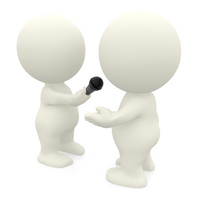Networking
Once you have landed the informational interview, it’s time to prepare to make the most of it in your job search.
Our last post focused on using personal and professional networking to set up informational interviews.
If you’ve secured an informational interview, congratulations! Now you need to prepare so you can make the most of this valuable contact. Remember, this informational interview is a tremendous opportunity to develop specific technical communication industry knowledge, build relationships with key industry experts, and acquire key information on types of jobs, salary, key locations and companies that are hiring.
Preparation
Format
If you haven’t already done so, finalize the details of the format—telephone, online or in-person—with your contact when confirming the date and time. Think about whether you would like to record the interview (using a tape recorder or your smart phone) to ensure you have a way to check back on your notes. If you want to record, you must be sure to ask your contact for permission to record, keeping in mind that some people are very uncomfortable with recording. If you are meeting in person, pick somewhere quiet where you can hear each other, and can take notes without distractions. If you have planned for your conversation to occur over the phone or online via Skype or Google + Hangout , check out the sound levels in advance, and consider using headphones to help with sound quality. You can always move where you are seated if the area is too loud.
Research
Do some research on the person who you are meeting with. The technical communications field is relatively small, so reach out to a couple of contacts to find out if they know this person and can offer background on their personality, job history, projects they have worked on, and work ethic. Use Google and LinkedIn to assist in your research. Find out they are members of professional associations such as the STC , or if they have spoken at or attended industry conferences (such as LavaCon or WritersUA ). Having this kind of background prior to the informational interview gives you the opportunity to create common ground, and break the ice. For example, if you attended LavaCon last year and know they also went, you can ask them who their favorite speaker or their opinion on the trends that were discussed.
Set Objectives
Before undertaking any worthwhile activity, you need to set objectives, and the informational interview is no different. Ask yourself a basic question: Why are you having this conversation with this person? Set a simple and direct objective for what you want to achieve in the course of the conversation. For example, if you are a technical writer looking to move into the training field and you are speaking to a technical trainer on their background and current duties, you could set your objective: “To develop an in depth understanding of a technical trainers written and unwritten roles and responsibilities.”
Questions
You have a lot of questions for this person, and you want to make the most of the time you have. So it’s useful to group those questions into three types:
- Job Specific: These are the basic questions, who do they work for, their role; what their responsibilities are; what a typical day looks like; key challenges; types of services the organization provides; and types of projects they get involved with.
- Industry Specific: Delve into the industry. who the major companies in this industry are; what do you think their strengths and weakness are, trends in the industry; and how the industry has changed since they started.
- Experience: questions on their unique perspective. Why they enjoy their role; How long they have been working in the industry in this role; how they secured their current role; qualifications needed to perform this role; specific any skills, knowledge, or degree they believe professionals in this role should have; recommendations for continuing education; and the career path for this role.
Make sure to include one or to wrap-up questions such as recommendations on other people to speak with, books to read, or websites to visit. Be conscience of the amount of time you have and front load your questions to ensure you don’t miss out on the key question you wanted asked. Think about the best way to capture the answers to the questions. One suggestion is to create a template such as an MS Word document with a table listing the questions on one side and blanks on the other.
Confirmation
The day before your informational interview, reach out to your contact either by phone or email to confirm your informational interview with all the essentials: time, date, and location, plus your contact details in case they are running late, have gotten lost, or have something come up at the last minute and are unable to make it.
Final Check
Before you leave for your interview (or head over to the computer):
- Make sure you have your questions (print them out , or have the document open for you to fill in answers)
- Dress appropriately (even if the conversation is online you can still be seen).
- Test your technology
- Have a map, directions or GPS along with parking information.
Showtime: the Informational Interview
You’ve prepared your questions, confirmed the details, and brought along the tools to capture answers. Now you ready for the actual informational interview part of your networking job search. finally If you are meeting your interviewee in person, make sure you get there earlier than the scheduled appointment, set up the table for taking notes and recording the conversation (if you have confirmed that the interview can be recorded) When your contact arrives greet them and engage in a short bit of small talk to make you both feel at ease. Thank the individual for their time and outline what you are looking to achieve through this conversation (your objective). Start asking your questions and remember to capture your contact’s answers. Most conversations won’t flow according to the order of your questions, so be flexible in the order of your questions. As long as you are able to ask your key questions the order doesn’t matter. Remember the time! Be conscience of your contact’s time, and make sure you wrap up questions in enough time. Thank your contact again as you finish up your conversation.
Follow up
Follow up the next day with a thank you email or physical note. Personalize the communication by including a point you that intrigued you. If you agreed to any kind of action items, make sure you complete them. It reinforces your image as a professional individual. With each informational interview you will gain more data that help refine your job search and expand your network. Set a target on the number of informational interviews you would like to undertake a month. By following the structure outlined above you will be able to gather enough information and contacts to assist in your job search or transition into a new job. Good luck!
In your job search, leverage your network for informational interviews to scout out companies and new industries.
Networking during your job search can involve a variety of activities, and one critical technique that canpay big dividends is the informational

Networking over coffee.
interview. The informational interview allows you to collect information on an industry or a company rather than directly seeking employment. If you want to enter the technical communications field, the informational interview gives you the opportunity to learn more about the key industry experts, types of jobs, salary, key locations and the companies. At the same time you’ll sharpen the interview skills you’ll need to tackle those subject matter experts after you land the job.
You can expand your network with an informational interview, no matter what stage your in on your job search. It gives you a chance to share your background and skills set without the pressure of trying to “land a job”. And you may even have a chance to help your contact with a dilemma they may be having!
Setting Up the Informational Interview Process
Like other phases of your job search, setting up an informational interview starts with identifying the industry (technical communication), the company, and the role you would like to understand more about. For example, you may be a technical writer working on user manuals, but want to transition to working in a role where you can do instructional design, usability or training.
When you have an industry, company and role identified, you’re ready to start taking advantage of your networks. There are two types of networks you can access in your job search: professional and personal.
Professional Network
You have contact with all sorts of professionals every day in your current technical communication job, and now is the time to capitalize on those contacts and expand your professional network to the areas you want to get into.
Brainstorm about those people who you would be interested in meeting for coffee, lunch or a drink after work. Odds are that there are quite a few, so it is good idea to track your networking activities by creating your own spreadsheet detailing name, job title, contact details, company, when you made reached out, when you plan to follow up and anything else you would like to track.
Choose your method of making contact carefully. You have worked with these individuals, so you should have a pretty good idea of how they like to interact: some people are good at responding to email, others by phone, and some you can’t seem attract a response unless you’re standing right in front of them. The goal is to grab their attention, so customize your contact methods to secure your opportunity for the informational interview.
As a technical writer, you will probably cross paths with people who work as instructional designers, usability experts, analysts and trainers. Reach out to them and find out if they would be interested in chatting about their company and the specific industry they work in. Let them know you’re aware their time is valuable. If they respond about how busy they are, suggest having a brief conversation over the phone, by Google+, IM or you could email them your questions. Accomodate their styles and their schedules by customizing the informational interview during your job search.
Don’t limit yourself to coworkers or acquaintances made during professional meetings. Is there is someone who is a leader within the industry whose brain you’d like to pick? Why not reach out to them? LinkedIn is a great networking source, and you request an introduction through a common contact, send them an InMail, or send them a direct connection request. For example if you’re interested in becoming a content strategist, you could introduce yourself to one via LinkedIn and request a few minutes to learn about the industry.
Personal Network
Family, friends and friends of friends have the potential to be great resources when you hunt for more about an industry or company!
Start by asking them who they know who works at that company, or who works in the industry with the job title you want to learn about. Our personal networks are full of people from all kinds of industry, and their networks just might have some contacts in the technical communication. You won’t know until you ask them. Keep in mind that when you ask for an introduction, you should assure that family member or friend you are just looking to undertake an informational interview, nothing more.
Take a similar approach to organizing the informational interview as your professional network with a decrease of sensitivity as these are personal contacts and they should be handled with the utmost care. You don’t want to frustrate your friend or family member by being ungrateful for their introduction and help.
Utilize your professional and personal networks to gather data on the industry, company or role you are interested in. Remember, during something as important as your job search, there is no such thing as a wasted conversation. You can learn about something you are interested in and move yourself further along towards landing that new job.
Coming Up: Preparing for the Informational Interview
Even though it’s more casual than the job interview, you still need to prepare for your informational interview. You want to come across as technical communications professional and competent individual. The next post will outline how to prepare informational interview during your job search, including figuring out what to ask, and the correct way to follow up after your conversation.
Business Networking Tips for Technical Communicators : Summer is the Season
 Summertime presents a great opportunity to technical communicators who want to reignite their networking. Really, what better time to take advantage of vacation schedules and fewer people in the office to organize a catch up with like-minded folks?
Summertime presents a great opportunity to technical communicators who want to reignite their networking. Really, what better time to take advantage of vacation schedules and fewer people in the office to organize a catch up with like-minded folks?
All too often, we get swamped with the often solitary writing, designing and rereading tasks to create to clear, concise, and accurate documentation, and don’t take time to develop relationships. Put that documentation down! Resolve to motivate yourself this summer, and if necessary, force yourself to leave your desk and the office for some professional networking.
Don’t Over-complicate Networking with Technical Communicators
Remember, networking is simply engaging in a conversation with a colleague, former colleague, friend or even a relative.
Set a goal to try to catch up with someone at least once a week. It can be over coffee, breakfast, lunch, drinks or even dinner. Start with colleagues or former coworkers with whom you enjoyed working in the past. Get more strategic and add some additional people to the networking calendar who work at a company you are looking at moving to.
Catch up is key here. When you sit down for coffee or iced tea, you want to find out what is happening in their professional and personal life. Share experiences to build rapport and strengthen the relationship. The power of your network is built on the strength of your relationships and it starts with simply catching up.
Networking relationships develop upon sharing experiences. Information shared is never wasted. The challenges you face right now are probably not unique, especially within the technical communication world. Ask for an opinion or advice about something you’re working on. You never know if your contact has been through a similar experience or project. Why not talk through a situation and get their feedback? Chances are they’ll return the favor, so be ready to offer advice based on your own experiences.
With former colleagues, find out how they are enjoying their new roles, especially if you are starting to look for a new role. These conversations can determine if you put this company on your future employer list or not, and can give you a clearer idea of the kind of work environment you want to seek out. Potential job roles are known to come up unprompted during these conversations. And remember, it is easier to recommend someone you know for a new role than an unknown entity.
So break free of the office. Enjoy the warm weather and warm conversations… and take advantage of the leads that summer technical communicators networking can bring.

